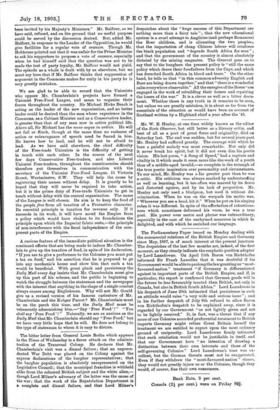The Parliamentary Paper issued on Monday dealing with the commercial
relations of the British Empire and Germany since May, 1897, is of much interest at the present juncture The despatches of the last few months are, indeed, of the firsl moment, as they clearly indicate the emphatic position adopteC by Lord Lansdowne. On April 15th Baron von Richthofen informed Sir Frank Laseelles that it was doubtful if his Government would be able to prolong the law granting us " most- favoured-nation " treatment "if Germany is differentiated against in important parts of the British Empire, and if, in particular, the report is confirmed that German goods will in the future be less favourably treated than British, not only in Canada, but also in British South Africa." Lord Lansdowne in his despatch of June 20th intimated that persistence in such an attitude would raise "a very wide and serious issue " ; and in his further despatch of July 8th refused to allow Baron von Richthofen's despatch to be explained away, since it is regarded by our Government "as not lightly given and not to be lightly received." It, in fact, was a threat that if any more of our Colonies accorded preferential treatment to British imports Germany might refuse Great Britain herself the treatment we are entitled to expect upon the most ordinary ground of reciprocity. Lord Lansdowne firmly intimated that such retaliation would not be justifiable in itself, and that our Government have "no intention of drawing a distinction between their own interests and those of the self-governing Colonies." Lord Lansdowne's tone was ex- cellent, but the German threats must not be exaggerated. Even if they withdrew the " most-favoured-nation " clause, they would not greatly injure us or the Colonies, though they would, of course, fine their own consumers.










































 Previous page
Previous page